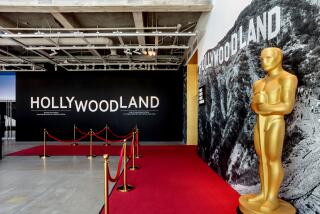Recalling Cinema’s Beginnings in ‘Long Ago’
- Share via
It was on April 20, 1896, that movies were first projected in America in a theater for paid admission, at Koster & Bial’s Music Hall in New York City. In keeping with the centennial of the movies, producer-director Ray Farkas, in his charming and revealing “Long, Long Ago,” asked 26 centenarians about their first memories of the movies.
“One of the marvels of the age . . . just like a dream”--these are some of the descriptions heard on the soundtrack behind the documentary’s opening credits. What’s so fascinating is how vivid the memories are of these centenarians’ first encounters with the cinema and how thrilling it was for them.
At least three of them actually were among the original audiences for “The Great Train Robbery” (1903), generally regarded as the first narrative American film. One man can describe it in detail; another recalls what a success it was for his parents, who were pioneer exhibitors.
Many recall how primitive the conditions were for the exhibition of the films--a screen might be a stretch of canvas held up by poles, a theater lit by oil lamps, many others merely converted storefronts--but no one really complained because the flickers were such an exciting phenomenon.
*
Farkas has astutely interwoven his interviews with clips from the films so well-remembered--while at the end reminding us that 95% of silent movies are no longer extant. He has then accompanied both recollections and the clips with a festive array of music, both the kind that pianists and later full orchestras played along with silent pictures and the popular songs that were so often sung between programs.
As one would expect, there’s enduring general enthusiasm expressed for the early stars like Charlie Chaplin as well as their pictures, but this documentary is full of astute observations. One woman says of Buster Keaton: “There was something so human, so touching about him.” A number of people exclaim how overwhelming an experience “The Birth of a Nation” was, but Bloomington, Minn., resident Mona Breckner, who looks and acts a good 25 or 30 years younger than her 101 years, adds that it “seemed to me prejudiced.” Another interviewee says bluntly that “it was a rap against the Negroes.”
The women still swoon over the likes of Douglas Fairbanks Sr. and especially Rudolph Valentino, the screen’s first great lover. “He was the best-looking thing you ever saw,” declares one woman, while another adds, “Boy, I’d like to find his shoes under my bed!”
Summing up the power of the cinema, 103-year-old Zada Lacklen remarks, “Silent movies began to show us a different way of life. They opened up a new world to me--that there was something outside Billings, Mont.”
* “Long, Long Ago” can be seen at 6:30 and again at 9:30 tonight on cable’s AMC.
More to Read
The biggest entertainment stories
Get our big stories about Hollywood, film, television, music, arts, culture and more right in your inbox as soon as they publish.
You may occasionally receive promotional content from the Los Angeles Times.










